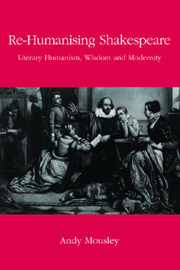Book contents
8 - Love: As You Like It
from Part II - How to Live
Published online by Cambridge University Press: 12 September 2012
Summary
As I argued in the Introduction, humanism has frequently been represented by anti-humanists as a mainstream affair, the lynchpin of western or bourgeois ideology or ideology in general (and sometimes all three at once). This is true of the three probably most influential anti-humanist critics who in the 1980s – the heyday of anti-humanist theory and criticism – produced books on the emergence of humanism in the Renaissance: Catherine Belsey, Jonathan Dollimore and Francis Barker. I have already discussed features of Belsey's and Dollimore's version of humanism in the Introduction, but, given one of the purposes of this chapter, to wrest humanism away from the mainstream, it is worth briefly rehearsing the opposite, anti-humanist perception of humanism as a dominant ideology. In The Subject of Tragedy (1985), Belsey claims that: ‘Liberal humanism, locating agency and meaning in the unified human subject, becomes an orthodoxy at the moment when the bourgeoisie is installed as the ruling class’. Meanwhile, Dollimore in Radical Tragedy (1984) writes of the ‘essentialist humanism which has pervaded English studies and carried within it a residual metaphysic, one which makes for the ideological effacement of socio-cultural difference and historical context’. The source of the ‘residual metaphysic’ present in English studies is ‘western metaphysics’ in general, with its ‘three indissociable categories’ of ‘the universal (or absolute), essence, and teleology’. Finally, in The Tremulous Private Body (1984), Francis Barker suggests that the influential modern equation of ‘literary greatness’ with ‘universality’, embodied in the ‘“broad humanism”’ of Shakespeare's texts, masks ‘historical difference’ and the historically specific nature of bourgeois subjectivity.
- Type
- Chapter
- Information
- Re-Humanising ShakespeareLiterary Humanism Wisdom and Modernity, pp. 140 - 157Publisher: Edinburgh University PressPrint publication year: 2007



